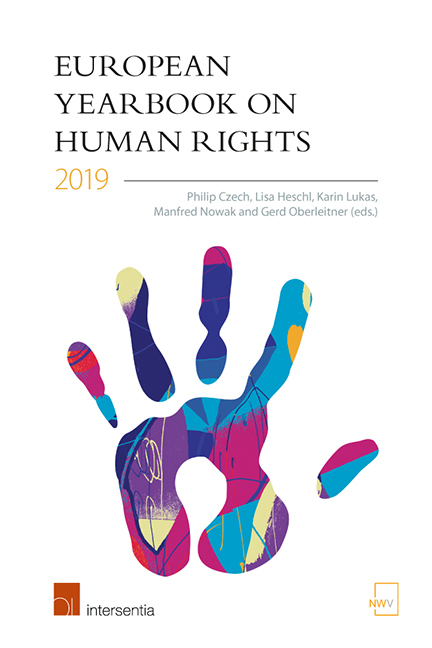Book contents
- Frontmatter
- Miscellaneous Frontmatter
- Editors’ Preface
- Contents
- List of Abbreviations
- List of Contributors
- PART I TOPIC OF THE YEAR
- PART II EU
- The Strange Case of Northern Ireland's Disappearing Rights in the EU-UK Withdrawal Negotiations
- Can Reasonable Accommodation Safeguard the Employment of People with Disabilities?
- Whistleblowing in Europe: A New Era of Legal Protections
- A Critical Take on Opinion 1/15: Is the Glass Half Full or Half Empty?
- Absolute Rightlessness Sur Place through Excessive Externalisation
- Corporate Accountability Mechanisms in EU Member States for Human Rights Abuses in Third Countries
- PART III CoE
- PART IV OSCE
- PART V REPORTS FROM THE FIELD
- PART VI OTHERS
- PART VII BOOK REVIEWS
- Index
Absolute Rightlessness Sur Place through Excessive Externalisation
from PART II - EU
Published online by Cambridge University Press: 24 January 2020
- Frontmatter
- Miscellaneous Frontmatter
- Editors’ Preface
- Contents
- List of Abbreviations
- List of Contributors
- PART I TOPIC OF THE YEAR
- PART II EU
- The Strange Case of Northern Ireland's Disappearing Rights in the EU-UK Withdrawal Negotiations
- Can Reasonable Accommodation Safeguard the Employment of People with Disabilities?
- Whistleblowing in Europe: A New Era of Legal Protections
- A Critical Take on Opinion 1/15: Is the Glass Half Full or Half Empty?
- Absolute Rightlessness Sur Place through Excessive Externalisation
- Corporate Accountability Mechanisms in EU Member States for Human Rights Abuses in Third Countries
- PART III CoE
- PART IV OSCE
- PART V REPORTS FROM THE FIELD
- PART VI OTHERS
- PART VII BOOK REVIEWS
- Index
Summary
ABSTRACT
This contribution explores the effect of European cooperation with Libyan actors to impede the movements of asylum-seekers towards Europe on the legal status of asylum-seekers. For this purpose, it first offers a graduated typology of the Arendtian notion of rightlessness applied to the process of accessing asylum. Analysing a series of interrelated factors involved in the producing of rightlessness, it then concludes that the European strategy of excessive externalisation is transmuting the legal status of asylum-seekers trapped in Libya from relative to absolute rightlessness sur place through obstructing any attempt to access legal status.
INTRODUCTION
The calamity of the rightless is not that they are deprived of life, liberty, and the pursuit of happiness, or of equality before the law and freedom of opinion – formulas which were designed to solve problems within given communities – but that they no longer belong to any community whatsoever. Their plight is not that they are not equal before the law, but that no law exists for them; not that they are oppressed but that nobody wants even to oppress them. Only in the last stage of a rather lengthy process is their right to live threatened; only if they remain perfectly'superfluous ’, if nobody can be found to ‘claim’ them, may their lives be in danger. Even the Nazis started their extermination of Jews by first depriving them of all legal status (the status of second-class citizenship) and cutting them off from the world of the living by herding them into ghettos and concentration camps; and before they set the gas chambers into motion they had carefully tested the ground and found out to their satisfaction that no country would claim these people. the point is that a condition of complete rightlessness was created before the right to live was challenged.
The collective experience of rightlessness in a disintegrating nation-states system during and after the Second World War brought forth the establishment of the 1951 Refugee Convention, heralding the development of further human rights documents and the strengthening of a wide-reaching system of international law.
- Type
- Chapter
- Information
- European Yearbook on Human Rights 2019 , pp. 133 - 156Publisher: IntersentiaPrint publication year: 2019



